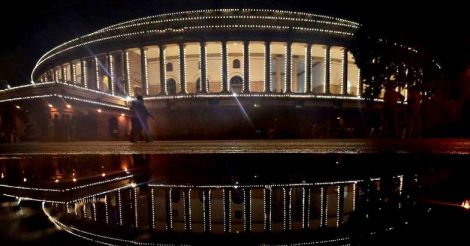Prakash Javadekar's weekends are blocked for the next five months. The human resource development minister's schedule hints he would spend five days from Monday to Friday attending to his work in the government.
Most Saturdays and Sundays will be devoted to the preparations for Karnataka assembly elections, which is due in the summer of 2018. Javadekar has been given the tough job of wresting the southern citadel from the powerful grip of Congress chief minister Siddaramaiah. He gets daily updates on the programs conducted by the Bharatiya Janata Party (BJP) in the state and also prepares strategies to convert possibilities into victories in each of the districts.
Read: Ram Nath Kovind: the articulate president who won’t toe the line
He is not the only minister entrusted with both a heavy ministry and an equally weighty political job. Finance minister Arun Jaitley, who is focusing on reviving the economy, is also the minister in charge of the BJP’s bid for a fresh term in Gujarat. Rural development minister Narendra Singh Tomar was busy with the party campaign and strategy in Himachal Pradesh.
Even tourism minister K.J. Alphons, a newcomer to both the BJP and the government, has been busy on the weekends working for election of a BJP government in the northeastern state of Meghalaya, making him undertake long journeys to fulfill engagements in the home state of Kerala. Since he is elected to Rajya Sabha from Rajasthan, Alphons jets in and out of east, west, south and north.
Read: What's holding India back from punching above its weight in sports?
Prime minister Narendra Modi and party president Amit Shah trust ministers more than the current crop of office bearers at the BJP headquarters in Delhi for several reasons. Most of the ministers are political heavyweights who have long experience in election management and have earned respect of state leaders and cadres.
These ministers like Jaitley, Ravi Shankar Prasad, Javadekar, Nirmala Sitharaman, Smriti Irani, Piyush Goyal (and Venkaiah Naidu before he became vice president) have also high TRP ratings so that their presence either in the party headquarters or in state capitals give better media visibility.
Jaitley gets more television live coverage, which sometimes even the party president, Amit Shah, cannot command. These ministers also have bilingual skills in Hindi and English. On the other hand, home minister Rajnath Singh, the most sought-after election campaigner after Modi in Hindi-speaking areas, is not comfortable in English. Sushma Swaraj, who is fluent in English, prefers, as a matter of policy, to give her political speeches and remarks in Hindi.
Another problem is that the party office bearers, who have not been reshuffled in the last three years by Shah, are not known on the platform. Barring organizing general secretary Ram Lal and general secretary Ram Madhav, who are from the RSS, the vice presidents and other general secretaries do not command much respect. Ram Lal avoids the media glare, while Ram Madhav prefers to comment on his charges in Jammu and Kashmir, and northeastern states.
Even in the northeast, the main strategist is Assam finance minister Himanta Biswa Sarma, whose defection from the Congress helped the BJP to form the government in the largest northeastern state. In fact, Anil Baluni, the party's media in charge, jokingly tells journalists that his job is to prevent negative news, not to give news.
Even to brief the media and announce party programs, ministers like Jaitley, Prasad, Sitaraman and Javadekar are invited, even though there are recognizable faces like Syed Shahnawaz Hussain and Meenakshi Lekhi in the panel of spokespersons.
But ministers argue that they remain political workers, and do not find the party work a distraction from their ministerial duties.
Javadekar is now battling the big challenges in higher education where he has been tasked to set up 10 world class government universities, and also clear the mess created by the de-recognition of more than a 100 deemed universities, and the confusion over withdrawal of university status to several national institutions of high importance, run by the government. Yet, Karnataka is of equal priority for him.

























